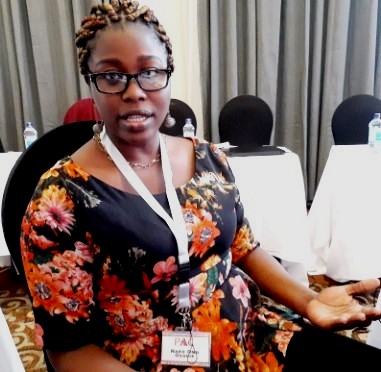Naro Omo-Osagie offers a portfolio of legal services that covers digital economy regulation. At the 7th Pan-African Conference (PAC) on Illicit Financial Flows (IFFS) in Nairobi, Kenya, she spoke with Olusegun Oruame, IT Edge News, on the challenges to implementation of digital taxation, and why stakeholders’ consensus is crucial to getting a digital tax regime in place.
Who is Naro Omo-Osagie?
My name is Naro Omo-Osagie. I am an associate at A & E Law Partnership. A & E Law Partnership is a legal consultant firm. We offer support to government and regulations across different sectors. In the past, we’ve worked on law reform on behalf of government. We’ve worked on policy advocacy on behalf of civil society groups, and we also do typical law practice. We offer companies secretarial services, legal representation on litigation matters. I work in the firm’s digital law and policy practice – that area of the firm deals with law and policy in the country’s digital economy; we work for both private and public sectors. In the public sector, we work on the area of policy advisory; we try to walk with government agencies by working on different policies that affect the country’s digital economy using our own perspective as lawyers working in the private sectors. We try to exchange perspective for them. We also work for private companies in the area of due diligence and regulatory compliance.
“Nigerian digital economy is actually one of the fastest growing digital economies in the world; there are so many opportunities”
How digital is Nigeria’s economy?
The Nigerian digital economy is actually one of the fastest growing digital economies in the world; there are so many opportunities, there’s a lot of work being done there and on both ends. There’s work being done in the private sector and there’s also work being done by the government. The government is doing a lot to help start-ups in that space. The Central Bank of Nigeria is doing a lot of work when it comes to regulating the fintech markets and I think that collective support, everybody’s hand being on deck, is helping the economy to grow. As regard to regulations, there is still a lot that needs to be done. But at the same time, there is also a lot being done and I think that’s commendable.
You’re a lawyer, specifically what are the legal challenges to our evolving into a digital economy?
I would say that the main challenge that I’ve noticed when it comes to digital economy regulation is very low knowledge of the laws among people in this space. There are people who interact with technology daily, a very large part of the population, but they are people who have very little knowledge about the enabling laws affecting that space. That lack of knowledge affects how government is able to regulate because these are people who do not know the law and who continue to act against the law. I also think that it prevents them from getting access to many opportunities by not knowing what laws apply, by also not knowing how to navigate the legal challenges, I think that is something that affects the people who work in this sector.
“The Nigerian economy … needs to be allowed to grow on its own before we start to stifle it with taxation, before we start to drown it in tax debt.”
This conference especially is about taxing, taxing a digital economy. How do we determine what digital product or service is to be taxed? What is the kind of enablement we should look at?
I think that understanding tax for companies operating in digital economy, you first have to start from your understanding of how these companies are taxed regardless of what platforms they are operating on. If these companies are registered, if they have their operations in Nigeria then you tax them the same way you tax other companies. You tax them according to their revenues, you tax them according to how much profit these companies are making and in many ways I think that there are many dimensions to digital economy taxation. There’s taxation of sale on big data which is one dimension of it, then there is digital taxation which is traditional taxation but effecting it through digital means. And there is taxation of companies just operating in that space whether you’re taxing them on their digital economy activities or you’re just taxing them the traditional way. So all of these issues have different ways of addressing them, ways of dealing with them and like I said, for a country like Nigeria that doesn’t have a digital tax law per se, there is the need now for all stakeholders to begin to work together so that everybody’s cards are on the table, so that everybody knows what they are looking at. It is important for everybody to work together and start to understand the different challenges that are facing the businesses in these sectors. The challenges facing big businesses are not the same challenges facing small businesses so you can’t address their tax issues together. It’s important to have different perspective from all these angles in the room when you’re deciding these things.

The FIRS said from 2020 they will start taxing online transaction, is that feasible?
I think that they already tax online transactions, they just don’t tax it directly, they tax it through the fintech companies and of course, those companies, in turn, transfer the cost to the end users. So how much difference that will be from what we already have is what is not clear yet. I think that there still needs to be a lot of stakeholders’ consultation before they begin to rollout these policies.
Many people in this conference believe there is a need for global consensus to tax the digital economy. You mentioned earlier about the absence of digital tax laws in Nigeria, do you think we are ready to be part of that global consensus?
I think that the Nigerian economy is growing at a rate where it needs a lot of support. It needs to be allowed to grow on its own before we start to stifle it with taxation, before we start to drown it in tax debt. So when you say if the economy is ready to go in that direction, well, I don’t think it’s a yes or no answer, necessarily. I think there are aspects of the economy that are ready to move onto that but there are also advantages and disadvantages on both sides. I think that there are advantages to taxing and disadvantages to taxing and all that matters is ensuring that you maintain a balance because on one hand, imposing heavy taxes in this growing sector can greatly stifle business. It can reduce the rate at which these businesses are growing, it can hold them back. And then at same time, this is also a very profitable sector and imposing tax on this sector will increase government revenue, so I understand that they are competing interest on both sides and it’s important that we find ways to balance this interest.





























